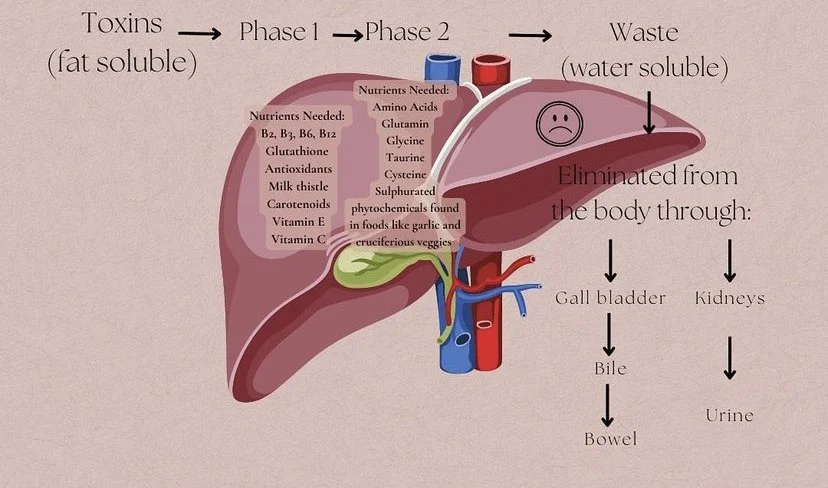How to Support your Liver
The liver is one of the body’s best filters. It removes toxins from our blood, regulates blood sugar levels and blood clotting, and maintains hundreds of other essential functions. That’s why it’s so important to understand how to support your liver.
While the advancement of technology and industry has brought so much good to the world, it has also taken a major toll on our bodies. Due to the burden of environmental and chemical exposures, a lack of nutrients in our diet, and even medications and supplements, our bodies work overtime to detoxify themselves. As a result, liver congestion is on the rise.
Liver congestion contributes to so many issues, and it’s often an overlooked root cause - until it turns into fatty liver disease and can no longer be ignored.
Supporting my liver has helped my own journey dealing with estrogen dominance (when your body doesn’t detox and convert estrogen properly, it leads to multiple symptoms). Once I started supporting my liver and helping my body with excess estrogen, I noticed significant improvement.
We can help our bodies detox with the choices we make daily, especially when it comes to foods. There are many ways to target liver health - some do require working one-on-one with a physician - but here are some foundational tips to help support your liver health.
Get to know how the liver actually works! Your liver detoxifies in phases, and it needs certain nutrients in order to detox. When we have a diet low in nutrients, it can slow down the detoxification process and lead to other issues.
Toxins go through a process to be eliminated. This process is called biotransformation of toxins. In order for this to happen effectively, fat-soluble toxins need to be converted into water-soluble toxins, so they can then be excreted.
I have heard many health providers laugh at the idea of a detox, and they are quick to say, “The body doesn’t need help to detoxify because it has organs that do that for us.”
While it’s true that many of our organs detoxify our bodies for us, they are also overloaded with the chemicals in food, toxins from fragrances in perfumes and candles, medications, supplements, pesticides, BPA in plastics, and so much more. They can’t handle all these toxins constantly.
As I said earlier, these toxins combined with lacking nutrients can slow down or keep the liver from doing its job. When the liver can’t do its job, its detoxification process is disrupted and, as a result, symptoms present themselves in the body as the body looks for other ways to get rid of toxins.These symptoms contribute to issues like:
disrupted sleep
acne and/or eczema
decreased absorption of nutrients
hormone imbalance
high cholesterol
So, what can we do?
Reduce stress. Stress can reduce blood flow to the liver and cause various other issues.
Avoid drinking caffeine on an empty stomach and first thing in the morning. The liver and adrenals are interconnected, and drinking caffeine first thing on an empty stomach can spike your stress hormone, cortisol. Cortisol dysregulation can lead to liver fatigue and gallbladder dysfunction.
Increase your protein intake. Most people are not eating enough protein, and your liver needs those amino acids via diet.
Increase your intake of vitamin B and magnesium.
Walk after meals to support balanced blood sugar levels.
Lower your toxic load. Slowly begin switching to low-toxic household products, like Branch Basics. The Environmental Working Group website (ewg.org) is a great reference. Dry brushing your body before showering is also a great way to support detoxification.
Be mindful of the nutrients being depleted if you are on birth control, especially B vitamins. Many forms of birth control are known to lead to liver congestion.
Increase your consumption of liver-supportive nutrients. This includes alliums, which are foods in the onion family (chives, garlic, onions, shallots, etc.). Other liver-supportive nutrients can be found in glycine (bone broth, gelatin, collagen or powdered glycine), beef liver, cod liver oil, sulfur-containing foods, artichokes, beets, carrots, certain greens and several herbs and spices.
Recommended Testing
Liver enzymes such as ALT, AST and GGT, Albumin, total protein, ALP and Bilirubin are to be read with the rest of your labs with your symptoms and medical history in mind.
I personally recommend requesting and partnering with a functional medicine provider who can read those for you because functional testing looks for optimal, not just disease or no disease.
HbA1c will help assess to what extent poor blood sugar control might be contributing to liver burden.
For more information on how to support your God-designed liver, you can check out my original post here!
As always, please consult with your medical provider prior to implementing anything you read on the internet. None of what I share is meant to be taken as medical advice. Rather, I share my knowledge and experience for educational purposes.
If, after consulting with your physician, you decide to implement any of these tips, I’d love to know what you’re doing and how it’s working for you. You can share them with me over on my Instagram @refined.wellness.by.megan. I can’t wait to see you there!

